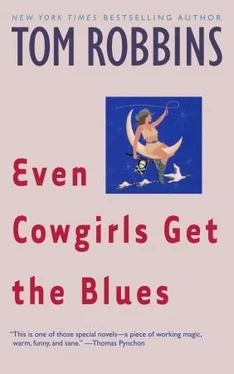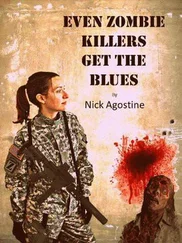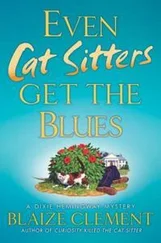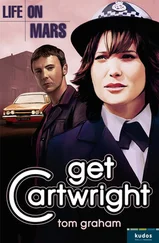Debbie, on cook duty that day, was defensive. “But spices aren't good for you,” she said. “Spices burn the tummy and inflame the senses,” she went on, using two metaphors improperly inspired by the fire.
The dissatisfied diners scoffed, and because little Debbie looked so near to tears, Bonanza Jellybean spoke in her behalf. “It's a well-known fact,” said Jelly, “that the reason India is overpopulated is because curry powder is an aphrodisiac.”
Delores del Ruby flicked an ember out of the reunion with a sharp crack of her whip. “Bullshit,” said Delores. “There isn't but one aphrodisiac in the world.
“And that's strange stuff.”
15.
"HITCHHIKING IS NOT A SPORT. It is not an art. It certainly isn't work, for it requires no particular ability nor does it produce anything of value. It's an adventure, I suppose, but a shallow, ignoble adventure. Hitchhiking is parasitic, no more than a reckless panhandling, as far as I can see."
Those were the words of Julian Gitche, spoken in exasperation to Sissy Hankshaw. Sissy did not bother to answer Julian's charges, and the author, who is ambivalent about the whole matter of hitchhiking, certainly is not going to answer them for her.
From Whitman to Steinbeck to Kerouac, and beyond to the restless broods of the seventies, the American road has represented choice, escape, opportunity, a way to somewhere else. However illusionary, the road was freedom, and the freest way to ride the road was hitchhiking. By the seventies, so many young Americans were on the road that hitchhiking did take on, Julian to the contrary, characteristics of sport. In the letters column of pop culture magazines such as Rolling Stone , hitchhikers boasted of records set for speed and distance, and whole manuals were published to advise those new to the “game.”
Oddly enough, Sissy was almost indifferent to this cultural phenomenon. To approach her for practical advice on the subject of hitchhiking would have been virtually futile. For example, she could not have told you, as did Ben Lobo and Sara Links in their booklet Side of the Road: A Hitchhikers Guide to the United States , that Montana laws strictly forbid hitchhiking in the vicinity of mental institutions. And it is difficult to say how she might have reacted to this piece of advice in Hitchhikers Handbook by Tom Grimm: “Don't use your thumb to hitchhike. Use a sign instead.”
And at this Grimm observation, “I doubt whether most girls could safely hitchhike long distances alone,” Sissy would have had to laugh.
Because by that day in the New York clinic when Dr. Goldman administered to her the “talk serum,” many years after the black musician's Lincoln had transported her away from home and family, Sissy could say:
“Please don't think me immodest, but I'm really the best. When my hands are in shape and my timing is right, I'm the best there is, ever was or ever will be.
“When I was younger, before this layoff that has nearly finished me, I hitchhiked one hundred and twenty-seven hours without stopping, without food or sleep, crossed the continent twice in six days, cooled my thumbs in both oceans and caught rides after midnight on unlighted highways, such was my skill, persuasion, rhythm. I set records and immediately cracked them; went farther, faster than any hitchhiker before or since. As I developed, however, I grew more concerned with subtleties and nuances of style. Time in terms of m.p.h. no longer interested me. I began to hitchhike in something akin to geological time: slow, ancient, vast. Daylight, I would sleep in ditches and under bushes, crawling out in the afternoon like the first fish crawling from the sea, stopping car after car and often as not refusing their lift, or riding only a mile and starting over again. I removed the freeway from its temporal context. Overpasses, clover-leafs, exit ramps took on the personality of Mayan ruins for me. Without destination, without cessation, my run was often silent and empty; there were no increments, no arbitrary graduations reducing time to functional units. I abstracted and purified. Then I began to juxtapose slow, extended runs with short, furiously fast ones — until I could compose melodies, concerti, entire symphonies of hitch. When poor Jack Kerouac heard about this, he got drunk for a week. I added dimensions to hitchhiking that others could not even understand. In the Age of the Automobile — and nothing has shaped our culture like the motor car — there have been many great drivers but only one great passenger. I have hitched and hiked over every state and half the nations, through blizzards and under rainbows, in deserts and in cities, backward and sideways, upstairs, downstairs and in my lady's chamber. There is no road that did not expect me. Fields of daisies bowed and gas pumps gurgled when I passed by. Every moo cow dipped toward me her full udder. With me, something different and deep, in bright focus and pointing the way, arrived in the practice of hitchhiking. I am the spirit and the heart of hitchhiking, I am its cortex and its medulla, I am its foundation and its culmination, I am the jewel in its lotus. And when I am really moving, stopping car after car after car, moving so freely, so clearly, so delicately that even the sex maniacs and the cops can only blink and let me pass, then I embody the rhythms of the universe, I feel what it is like to be the universe, I am in a state of grace.
“You may claim that I've an unfair advantage, but no more so than Nijinsky, whose reputation as history's most incomparable dancer is untainted by the fact that his feet were abnormal, having the bone structure of bird feet. Nature built Nijinsky to dance, me to direct traffic. And speaking of birds, they say birds are stupid, but I once taught a parakeet to hitchhike. Couldn't speak a word, but he was a hitchhiking fool. I let him get rides for us all across the West, and then he indicated that he wanted to set out on his own. I let him go and the very first car he stopped was carrying two Siamese cats. Tsk tsk. Maybe birds are stupid at that.”
16.
THE SO-CALLED TALK SERUM is essentially racemic methedrine with a pinch of Sodium Pentothal. It is not to be confused with the controversial “truth serum,” which is wholly Sodium Pentothal. Indeed, according to Dr. Goldman, the talk serum may cause a subject to exaggerate. Clearly, he believed Sissy Hankshaw guilty of overstatement while under the influence of the injection.
The author frankly doesn't know. The author isn't altogether certain that there is any such thing as exaggeration. Our brains permit us to utilize such a wee fraction of their resources that, in a sense, everything we experience is a reduction.
We employ drugs, yogic techniques and poetics — and a thousand more clumsy methods — in an effort just to bring things back up to normal.
So much for that. And so much for Sissy Hankshaw's testimony on hitchhiking, whether distorted or exact. There is something else to get at here. Listen.
Suppose you awoke one morning with the uneasy feeling that the world had, while you slept, somehow slipped a-tilt and rose to find that your dresser drawers were mysteriously open a fraction of an inch and that prescription bottles had tipped over in the medicine cabinet (although neither you nor anyone else in your household had ventured since bedtime to get an aspirin, a condom or a Tums) and that pictures on the wall, shades on the lamps and books in the case were askew. Outdoors, the taller buildings were posing à la Pisa, or, should you live in the country, streams were running slightly outside their grooves as fruits dropped like gargoyle ganglia from the uniformly leaning trees. What would be your reaction to such a phenomenon? Honestly, now, and seriously, too. How would you feel? Would you be scared? Confused? Puzzled and anxious? Would you telephone the police? Would you pray? Or would you numbly await an explanation, refusing to attempt to analyze the event or even to experience it with your full emotions until you had read the papers, tuned in the news, heard how experts from the universities were explaining the tilt, learned how the Pentagon planned to deal with it, were reassured by the President, who might insist, as Presidents will, that nothing really nothing had gone wrong? Or instead of fear, bewilderment and anxiety, or in addition to fear, bewilderment and anxiety, or instead of a hard impulse to dismiss the happening and get back to business-as-usual, or in addition to a hard impulse to dismiss the happening and get back to business-as-usual, do you imagine that a bright trace of delight, unnamable and indefensible, might tickle your spine; could you feel in an odd way elated — elated, perhaps, because, in a rational world where even disasters are familiar and damn near routine, something of almost fairytale flavor had occurred?
Читать дальше












